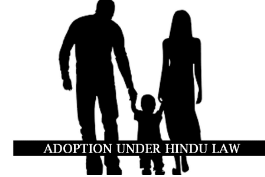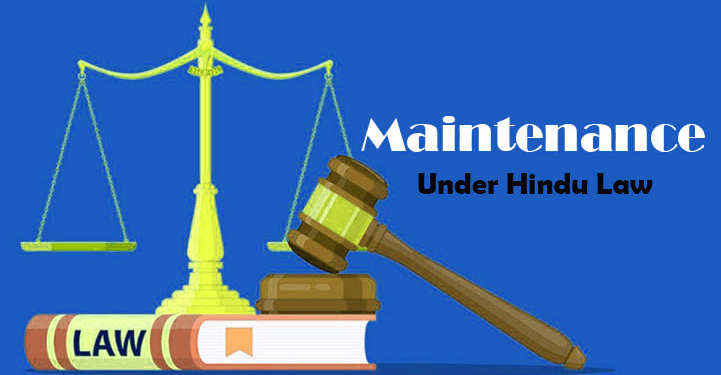Hindu Law | Civil Law for Judiciary Exams PDF Download
| Table of contents |

|
| Streedhan Law: A Comprehensive Overview |

|
| Adoption under Hindu Law |

|
| Law of Maintenance Under Hindu Law |

|
| Doctrine of Pious Obligation |

|
Streedhan Law: A Comprehensive Overview
Definition and Meaning of Streedhan in Hindu Law
- The term Streedhan comes from Sanskrit, where Stri means "woman" and dhana means "property." Thus, it translates to "woman's property."
What Constitutes Streedhan?
Streedhan includes all types of movable and immovable property, such as gifts and jewelry, received by a woman at various life stages:
- Before Marriage: Property or gifts received prior to marriage.
- At the Time of Marriage: Items given during the marriage ceremony.
- During Childbirth: Gifts received upon the birth of a child.
- During Widowhood: Property given during the period of widowhood.
Legal Recognition and Evolution of Streedhan in Hindu Law
- Initially, women needed their husband's permission to manage or sell their Streedhan.
- The Hindu Succession Act, 1956 changed this, allowing women to be absolute owners of their properties.
- It categorizes property into two types:
- Streedhan: Property women can enjoy and sell freely.
- Women’s Estate: Property with limited rights, where women cannot sell it at will.
Legal Status of Streedhan in India
- Women have full rights over their Streedhan; they can use it as they wish.
- This makes Streedhan legal and recognized, unlike dowry, which is illegal under the Dowry Prohibition Act of 1961.
Difference Between Streedhan and Dowry
- Streedhan consists of voluntary gifts given to women, while dowry is often coerced and linked to marriage transactions, making it illegal.
Development of Streedhan Law in Indian Courts
- In the case of Pratibha Rani v. Suraj Kumar, the Supreme Court clarified the difference between dowry and Streedhan.
- The court outlined what qualifies as Streedhan, including gifts made during the wedding and those given by the bride’s family.
- Women can reclaim their Streedhan from husbands under relevant laws if necessary.
Acquisition and Rights over Streedhan
According to the Hindu Succession Act, 1956, women gain absolute rights over property received from various sources, including:
- Gifts received at different life stages.
- Inheritance and property earned through work.
- Property received in legal settlements.
It’s important for women to keep records of all gifts and properties received.
Application under Allied Laws
Various laws protect a woman's right to her Streedhan:
- Section 14 of the Hindu Succession Act: Ensures that if Streedhan is with her husband or in-laws, they must return it on demand.
- Domestic Violence Act, 2005: Allows women to recover their Streedhan if they face domestic violence.
Empowerment through Streedhan
- Streedhan empowers women to own property and promotes independence.
- It enhances women's societal status and provides them security and authority over their assets.
- Women have rights to:
- Manage their property.
- Transfer their property under specific legal conditions.
- Surrender their estate voluntarily under certain rules.
Conclusion
- The Hindu Succession Act, 1956 was a major step in supporting women's property rights, allowing them to hold land and property as absolute owners.
- It eliminated the historical barriers that prevented women from owning property, thus promoting gender equality in inheritance laws.
Adoption under Hindu Law
- The Hindu Adoptions and Maintenance Act (HAMA) was enacted in 1956 to standardize Hindu adoption practices.
- This Act applies only to Hindus and is not effective beyond India.

Definition of Adoption
- Adoption is the process where an adopted child is permanently separated from their biological parents and becomes the legal child of the adoptive parents, gaining all associated rights and responsibilities.
Key Requirements for Adoption (Section 6)
- The adopter must have the capacity and right to adopt.
- The biological parent must have the capacity to give the child up for adoption.
- The child must be eligible for adoption as per the Act.
- All adoption procedures must comply with the rules of HAMA.
Conditions for Male Hindus to Adopt (Section 7)
- The male adopter must be a major and of sound mind.
- Consent from the wife is mandatory; without it, the adoption is void.
- To adopt a daughter, the male must be at least 21 years older than the girl.
Conditions for Female Hindus to Adopt (Section 8)
- The female adopter must be of legal age and of sound mind.
- If married, she must obtain her husband's full consent. If he is of unsound mind or has renounced Hinduism, her consent is not required.
- To adopt a boy, she must be 21 years older than the child.
Who Can Give a Child for Adoption (Section 9)
- The father can give the child for adoption if he is alive, but needs the mother's consent unless she has renounced the world, ceased to be a Hindu, or is declared unsound by a court.
- The mother can adopt if the father is deceased or has renounced his responsibilities.
- If both parents are dead or unknown, a guardian can give the child up for adoption with court approval, ensuring it's in the child’s best interest.
Eligibility for Adoption (Section 10)
- The child must be a Hindu.
- The child must not have been previously adopted.
- The child must be unmarried and under 15 years old.
Registration of Adoption (Section 16)
- Adoptions must be registered with the Registrar of Documents.
- A registered adoption serves as evidence but is not conclusive proof.
Prevention of Payments in Adoption (Section 17)
- Payments for adoption are prohibited to prevent trafficking and exploitation.
- Violating this provision can lead to imprisonment for up to six months or a fine.
Irrevocability of Adoption
- Once adopted, a child cannot return to their biological family or have the adoption canceled.
- Properly executed adoptions are final.
Effects of Valid Adoption
- An adopted child is considered a natural child of the adoptive parents.
- All ties with the biological family are severed.
- The child cannot marry anyone they could not have married before adoption.
- Any property the child owned prior to adoption remains theirs, but they do not affect the estate of their adoptive family members.
Law of Maintenance Under Hindu Law
- The term maintenance covers essential living expenses, not just survival needs.
- Defined in Section 3(b) of the Hindu Adoption and Maintenance Act (HAMA), 1956, it includes provisions for food, clothing, shelter, as well as education and medical expenses.

Maintenance can be claimed under two laws:
- The Hindu Adoption and Maintenance Act, 1956 (HAMA)
- The Hindu Marriage Act, 1955 (HMA)
Maintenance under HAMA, 1956
HAMA provides rules for maintenance for various individuals including:
- Wives
- Children
- Aged or infirm parents
- Widowed daughter-in-law
- Dependents
The main aim is to support those who cannot support themselves, particularly divorced wives, aged parents, and minor children.
Who can claim maintenance under HAMA, 1956?
- Wife
- Widowed daughter-in-law
- Children (both legitimate and illegitimate)
- Parents
- Any other dependent person
Maintenance of Wife (Section 18 of HAMA, 1956):
Section 18(1): The husband must maintain his wife during their marriage. His obligation lasts as long as she remains with him unless she leaves without justification.
Section 18(2): A wife living separately for justified reasons is entitled to maintenance. Justifiable reasons include:
- If the husband has deserted her.
- If the husband has treated her with cruelty.
- If the husband is suffering from serious illness (like leprosy).
- If he has another wife or keeps a concubine.
- If he has converted to another religion.
- Any other reasonable cause.
Section 18(3): A wife cannot claim maintenance if she has been unchaste or has converted to another religion.
Maintenance of Widowed Daughter-in-Law (Section 19 of HAMA, 1956):
- Section 19(1): A widowed daughter-in-law can claim maintenance from her father-in-law if she cannot support herself.
- Conditions where the father-in-law is not liable include lack of means or if the daughter-in-law remarries.
Maintenance of Children and Aged Parents (Section 20 of HAMA, 1956):
- Hindus must maintain their children (including minors and both legitimate and illegitimate) and aged or infirm parents who cannot support themselves.
Maintenance of Dependents (Section 21 and 22 of HAMA, 1956):
- These sections provide rights for dependents who are relatives of deceased Hindus, allowing them to claim maintenance from the deceased's estate.
- The right exists against property, not against heirs personally, and only arises after the person's death.
Maintenance Under Hindu Marriage Act, 1955:
The HMA outlines two types of maintenance claims:
- Section 24 - Temporary Maintenance: The court can order maintenance during proceedings if one spouse lacks enough income.
- Section 25 - Permanent Maintenance: Granted after divorce or separation, this can be a lump sum or monthly payment until the recipient remarries or passes away.
Case Laws:
- Raj Kishore Mishra v. Meena Mishra (1994): The Allahabad High Court ruled that a father-in-law is not obligated to maintain his daughter-in-law if he lacks the means to do so.
- Amar Kanta Sen v. Sovana Sen (1960): The Calcutta High Court decided that a wife living in adultery can still be entitled to maintenance, but if she can support herself, she is not entitled to it.
Doctrine of Pious Obligation
- The Doctrine of Pious Obligation holds that sons are responsible for repaying their father's debts, especially those incurred for legal reasons.
- Debts for immoral or unethical purposes are excluded from this obligation.
- This doctrine was largely impacted by the Hindu Succession (Amendment) Act, 2005, which abolished its application to future debts while maintaining liability for debts incurred before the amendment.

What is the Doctrine of Pious Obligation?
- The doctrine connects debts to a religious duty for sons to settle their father's debts after his death.
- Sons are obliged to pay off debts unless those debts are related to unlawful activities.
- The purpose is to provide spiritual relief to the deceased rather than just benefiting creditors.
Origin of the Doctrine of Pious Obligation
- The Supreme Court in the case of Sidheshwar Mukherjee v. Bhubneshwar Prasad Narain Singh (1953) traced the origins of this doctrine to ancient texts.
- According to Yajnavalkya, sons and grandsons must pay their deceased father's debts.
- Texts by Brihaspati and Narada emphasize the spiritual consequences of unpaid debts.
Types of Debt under the Doctrine of Pious Obligation
- Vyavaharika Debt: These are legitimate debts that are binding on the son, such as business debts and legal expenses.
- Avyavaharik Debt: These debts are incurred for unlawful purposes like gambling or alcohol and are not binding on sons.
Laws Related to the Doctrine of Pious Obligation
- The Hindu Succession (Amendment) Act, 2005 aimed to provide equal rights to daughters in inheritance, addressing gender inequality.
- This amendment prohibits courts from holding sons liable for their ancestors' debts under the pious obligation doctrine.
Issues Leading to the Abolishment of the Doctrine
- The 2005 amendment aimed to correct irregularities, especially highlighted in the Padminibai v. Arvind Purandhar Murabatte (1987) case.
- There were concerns that this doctrine could extend the liability of daughters for their father's debts if they inherited property.
- The exclusion of women from coparcenary rights in family property prompted the need for change.
Case Laws on the Doctrine of Pious Obligation
- Muttayan Chettiar v. Sangili Vira Pandia Chinnatambiar (1882): The court recognized the doctrine as a legal obligation tied to ancestral property.
- Somasundaran v. Narasimhachariar (1905): The court ruled that converting to another faith does not exempt the son from repaying debts incurred before the conversion.
- Vineeta Sharma v. Rakesh Sharma and Ors (2020): The Supreme Court confirmed that the 2005 amendment applies retrospectively, making daughters equally liable as sons for debts.
|
363 docs|256 tests
|














